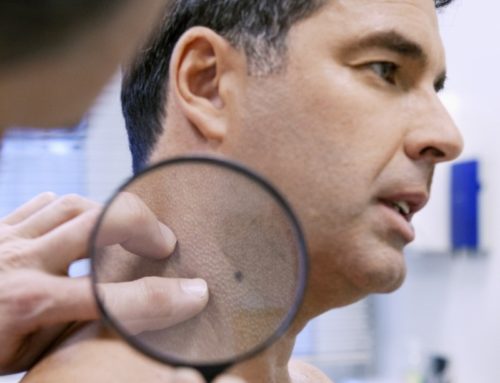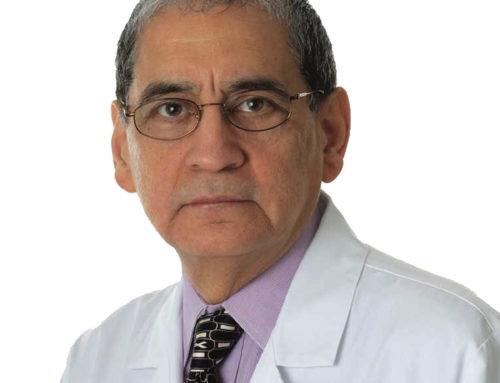Hand tremors, excessive sweating, weight loss, problems sleeping. These symptoms, along with nervousness, anxiety and rapid heartbeat, could be symptoms of an overactive thyroid. Like most conditions involving the thyroid, it’s more common in women than men.
“Simply put, hyperthyroidism is the body’s inappropriate production of the thyroid hormone,” says Michael Roe, M.D., general surgeon with University Surgical Associates who specializes in endocrine conditions. “An overactive thyroid can speed up your metabolism, leading to a wide range of symptoms that cause disruptions in the body – from nervousness and irritability to heart palpitations and changes in hair, skin, and a woman’s menstrual cycle.”
You might be wondering what leads to problems with the thyroid gland. Although there are other less common reasons for hyperthyroidism, Dr. Roe points to three main causes – toxic multinodular goiter, toxic adenoma, and Graves’ disease.

In toxic multinodular goiter, one or more growths in the thyroid start to produce too much thyroid hormone resulting in hyperthyroidism. Toxic adenoma, or a single thyroid nodule, can also be a reason for an increase in this hormone. The most common condition that triggers hyperthyroidism is Graves’ disease, an autoimmune disorder that leads the immune system to attack the thyroid gland. The result is more thyroid hormone than your body needs.
“Patients often complain of symptoms like irritability and rapid heartbeat, and they feel jittery and fatigued but can’t get the rest they need,” says Dr. Roe. “About one-third of patients will have an autoimmune phenomenon that causes their eyes to bulge. Blood testing that confirms an overactive thyroid combined with bulging eyes is definitively Graves’ disease.”
Diagnosis and Treatment
No matter the initial cause of overactive thyroid, you’ll likely be diagnosed through a combination of medical history, physical exam, and blood tests that measure thyroid levels. A radioiodine uptake test, a thyroid scan or a thyroid ultrasound may be used to provide a more specific diagnosis.
Treatment for hyperthyroidism is dependent on multiple factors and can include antithyroid medications, radioactive iodine, or surgery. Antithyroid medications help control hormone production gradually and may take up to a year or more to see complete symptom relief. Radioactive iodine effectively shrinks the thyroid gland, which in turn reduces hormone production.
“Surgery to remove the thyroid is an option if patients can’t tolerate the antithyroid medication or don’t want to have radioactive iodine therapy. Immediately after surgery, the body has no thyroid hormone, meaning patients who choose this option must be placed on medication to supply the correct amount of thyroid hormone the body needs,” says Dr. Roe. “If surgery is necessary, most people take one to two weeks to fully recover but begin feeling better almost immediately.”
Because hyperthyroidism is a complex condition, it’s important to have an expert to help you determine the very best course of treatment for your long-term health. If you are experiencing the symptoms of hyperthyroidism, talk to you doctor right away. To schedule a consultation, call (423) 267-0466.
S. Michael Roe, MD, FACS
Dr. Roe, board certified through the American Board of Surgery (ABS) and a Fellow of the American College of Surgeons (FACS), specializes in endocrine and laparoscopic surgery. He is an associate professor of surgery, Department of Surgery, University of Tennessee College of Medicine, Chattanooga and former Chief of Surgical Services at CHI Memorial and Erlanger Hospital. Dr. Roe sees patients at Erlanger’s Medical Mall and at USA’s Gunbarrel Road office at Erlanger East.







Leave A Comment